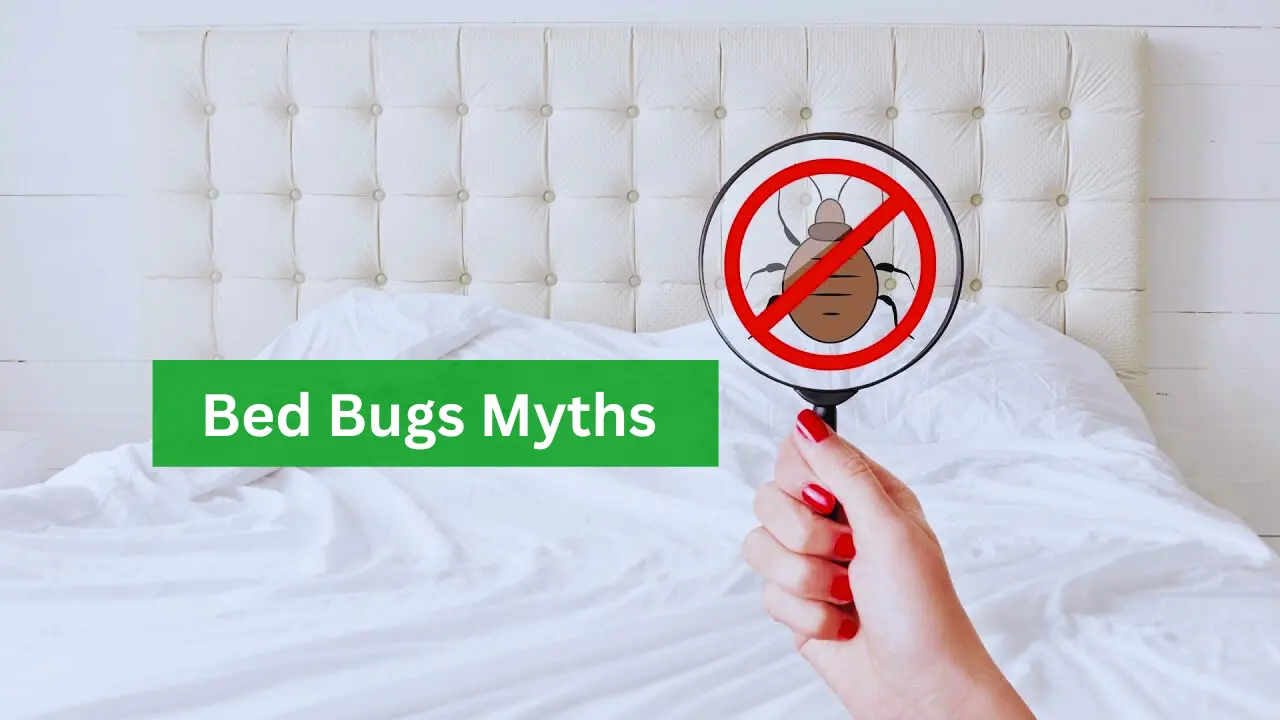
While bed bugs have become a growing concern across the globe, their resurgence is replete with various myths and misconceptions. Besides having an irritatingly pesky bug, they cause no small amount of sleepless nights and anxiety. This article has demonstrated how we can set the record straight on the most common bed bug myths by retaining the focus on the facts you ought to know when faced with an imminent infestation.
Basic Information About Bed Bugs
Where do bed bugs originate from?
Most people wonder where they come from and if they just magically appear. Generally speaking, bed bugs are brought in by items such as luggage, clothing, and even furniture. They relate not to dirt but to warmth and carbon dioxide from humans. Thus, this is usually spread by travelers or in secondhand furniture.
What are bed bugs?
Bed bugs are small insects, generally red or brown in color, that feed on the blood of humans and animals. They are about the size of an apple seed, appear flat, and have an oval shape; they also can be found hiding in any small crack and crevice anywhere near where it will feed, such as mattresses, headboards, and couches.
Adult Bed Bugs: How to Identify
Adult bed bugs are approximately the size of an apple seed, about 5–7mm in length. They can be easily seen, though many people often mistake them for other insects. After feeding, the body inflates and turns reddish in color, making it easier for a person to identify their presence.
Bed Bugs vs Ticks: Key Differences
Although both are hematophagous insects, bed bugs and ticks behave differently and have different priorities when it comes to host selection. While the bed bug is an active nocturnal feeder but prefers to feed on a human host, the tick can attach itself to animals and humans during the daytime. Bed bugs can be seen with the naked eye; a tick, not quite so.
Do bed bugs have wings?
They have no wings or any other wing-like structures and, therefore, cannot fly; they crawl from one point to another. So, against the myths taken up, bed bugs cannot fly.
Do bed bugs fly?
No, bed bugs cannot fly. In contrast to those mythologies concerning these insects, they do not have wings and hence are unable to fly. They crawl to get from one place to another, mostly using their legs to move along on furniture, carpets, and other such surfaces.
How Big Are Bed Bugs?
This will be mentioned later, but bed bugs are less than the size of an apple seed, generally 5 to 7 millimeters in length. They can be a little smaller if they have not fed for a long time but expand with a feed of blood.
Are bed bugs visible to the naked eye?
Yeah, bed bugs are large enough in size to be seen by the naked eye, especially while engorging. However, bed bugs are great at hiding during the day, which makes them tough to spot.
Bed bugs in shoes – Do they really hide there?
Yes, bed bugs can hide in shoes. These insect pests are good at concealing themselves from cracks and crevices to other places like shoes, bags, or just any other personal belongings. This is among those reasons whereby they spread during traveling or carrying infested belongings into new places.
Bed Bug Behaviour
How long does a bed bug live?
Bed bugs, under normal conditions, will usually survive for six to twelve months. Though most of their survival would depend on the availability of nutrition, besides that environmental conditions do affect the life cycle. When food sources are readily available, they are going to be at their best in having ideal conditions for an infestation.
How long does a bed bug survive without a host?
Non-feeding bed bugs can survive for several months without a host, essentially at the mercy of the outside temperature and conditions. In cooler weather regions, they could survive without feeding for as long as a year.
How long does a bed bug live without feeding?
The fact is, bed bugs can survive for several months without feeding: adults can survive for several weeks, even months, without a blood meal, and that is the reason behind their toughness.
How long can bed bugs survive without food?
Bed bugs can survive for several months without food. This time period in no way is indefinite, and they do need to feed on blood for life and reproduction.
How Long Can Bed Bugs Go Without Feeding?
Bed bugs can survive several weeks to months without feeding, depending on the conditions they are subjected to within the environment. If they remain in a cold environment, the rate of their metabolism goes down, allowing them to go quite some time without feeding.
How long does a bed bug survive without blood?
Without blood, they cannot survive beyond a few months. They are bed bugs that feed solely on it. Without it, they would finally perish.
How often do bed bugs feed?
When available, bed bugs feed every 5–10 days on average. They feed at night while humans are sleeping but may feed during daytime when they are hungry enough.
What do bed bugs feed on?
They feed solely on blood, and human beings are the preferred hosts for these bed bugs. Bed bugs are always attracted by the warmth and carbon dioxide emitted, which in their perspective acts as an indication that it is now the time of feeding.
How do bed bugs spread?
They are spread from one place to another by hitchhiking onto personal items like suitcases, clothes, and furniture. Bed bugs migrate from room to room, building to building, and even from city to city quite effectively.
Do bed bugs jump?
No, bed bugs don’t jump; they walk on the surface and hide fantastically well in the cracks, crevices, and seams of furniture.
How Fast Do Bed Bugs Breed?
Amazingly, bed bugs are relatively slower breeders compared to other pests. Each female bed bug lays approximately one egg daily, which would take roughly about 10 days to hatch. It takes approximately six weeks for them to develop into adults.
Bed Bug Physical Capabilities
Do bed bugs fly?
As above, bed bugs can’t fly. While easily distributed and quick-moving, bed bugs can’t get from place to place but by crawling.
Do bed bugs jump?
No, bed bugs cannot jump. They are not designed for jumping as fleas are. They crawl very fast and usually get transported by things like bags, clothes, and furniture.
Do Bed Bugs Stay Outdoors?
They generally would not be found outdoors because most bed bugs require a warm environment for survival. It could be outdoors, though, especially in situations regarding people entering and leaving their homes with items.
Can bed bugs survive outdoors?
While most bed bugs were indoor pests, it would be expected that they would tend to be in places close to human habitation. Not all bed bugs are indoors, though; they can live outdoors when it puts them closer to a heat source or in an area where humans may rest.
Do bed bugs move quickly?
Not that they are especially quick, but bed bugs can move at a speed of about one meter per minute. That is the reason it is so easy for them to distribute on both the floor and furniture, even in other rooms.
Human Interaction & Symptoms
How long do bed bug bites last?
While some may last for a few days, for those very sensitive to such bites, their condition may take a whole week of existence. The manifestations associated with bed bug bites are itching, redness, and swelling. Worse, it may irritate the skin with the bites, which needs medical attention.
Where do bed bugs hide?
Bed bugs like to hide in dark places, closed to where their host sleeps. They are found in the cracks of bed frames, mattress seams, and behind headboards, even coming out of wall outlets.
Can bed bugs live in your hair?
No, bed bugs do not live in hair. They would rather remain in places where they would have easy access to a blood meal: the seams of mattresses, behind furniture amongst others. They are not survivors in hair.
Do bed bugs pose any hazard?
From a medical importance of disease transmission point of view, there is no importance related to bed bugs. However, their bites may result in various allergic manifestations, skin irritation, and anxiety. The most extreme cases can also be subjected to secondary infections resulting from excessive scratching.
Do Bed Bugs Carry Diseases?
No, bed bugs do not transmit diseases. Though they carry a number of pathogens, they never transmit them to the host. Their bites could be very itchy and give much discomfort to the host but as a vector of disease like mosquitoes and ticks, they do not act so.
Do Bed Bugs Remain on Your Body?
They never stay on your body; they would rather feed upon you and go back right in their hideout. They never stay on your skin like lice or ticks do.
Prevention & Treatment
How do bed bugs die off naturally, exactly?
Eventually, bed bugs will die without a blood meal available. They can only survive if feeding regularly. One of the solutions is when there’s an infestation control applied, which results in the successful eradication of the bugs.
What is best for killing bed bugs?
Vacuuming, hot steam treatment, and insecticide work best to kill bed bugs. Always consult pest control professionals for effective solutions when getting rid of these pests.
Can essential oils kill bed bugs?
Essential oils such as lavender oil and peppermint oil may repel bed bugs, though they are unlikely to be effective for exterminating the entire infestation. Professional pest control is always advised.
Is it worth treating bed bugs?
Yes, controlling bed bugs is essential because they don’t stop multiplying and growing unless professionally eradicated.
At Best at Pest we have the best treatments and advice required to rid yourself of these nuisance insects. For comprehensive bed bug control, call today!



